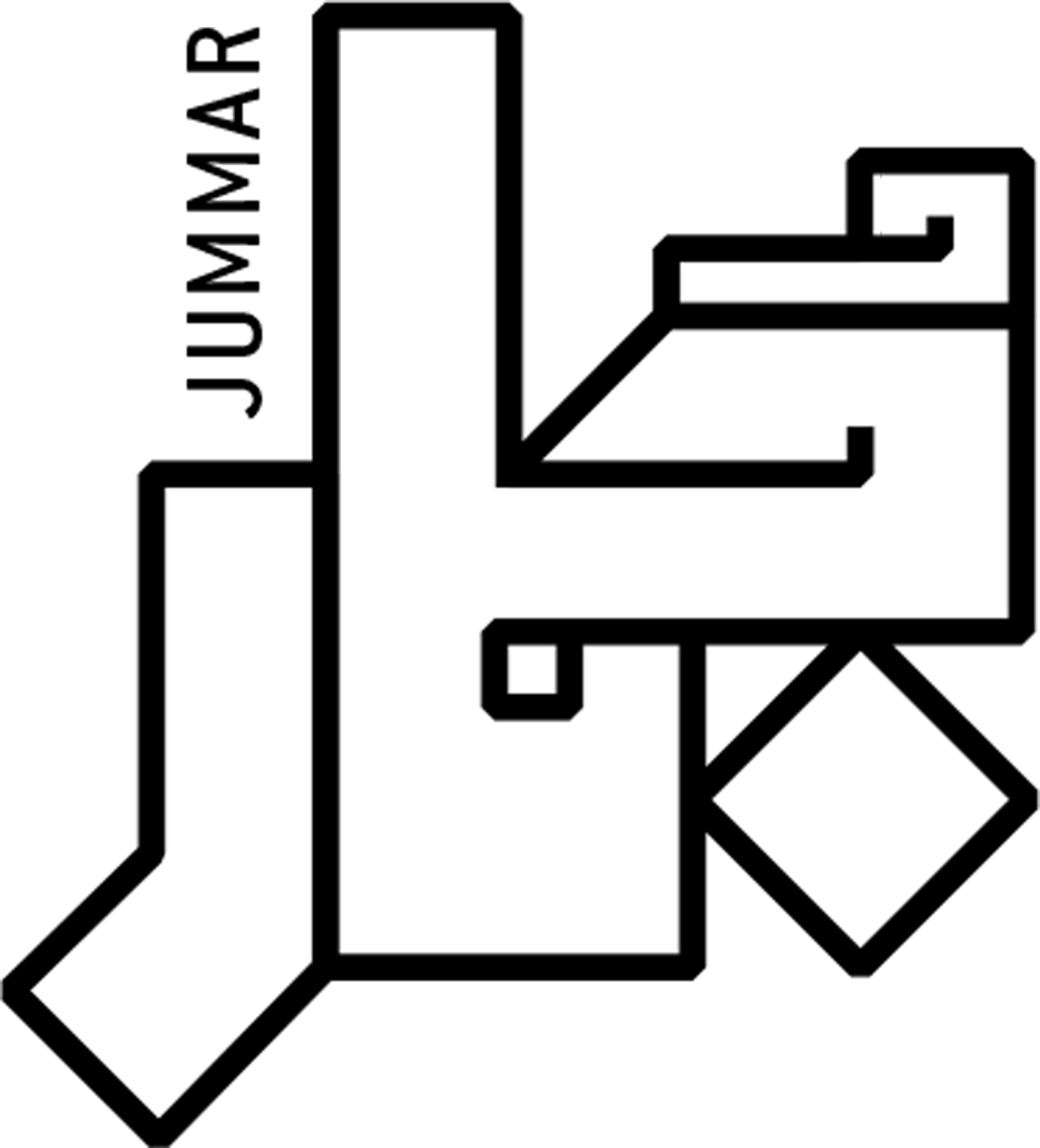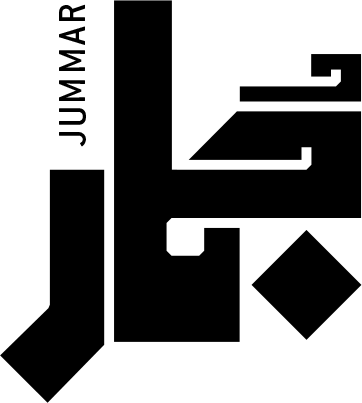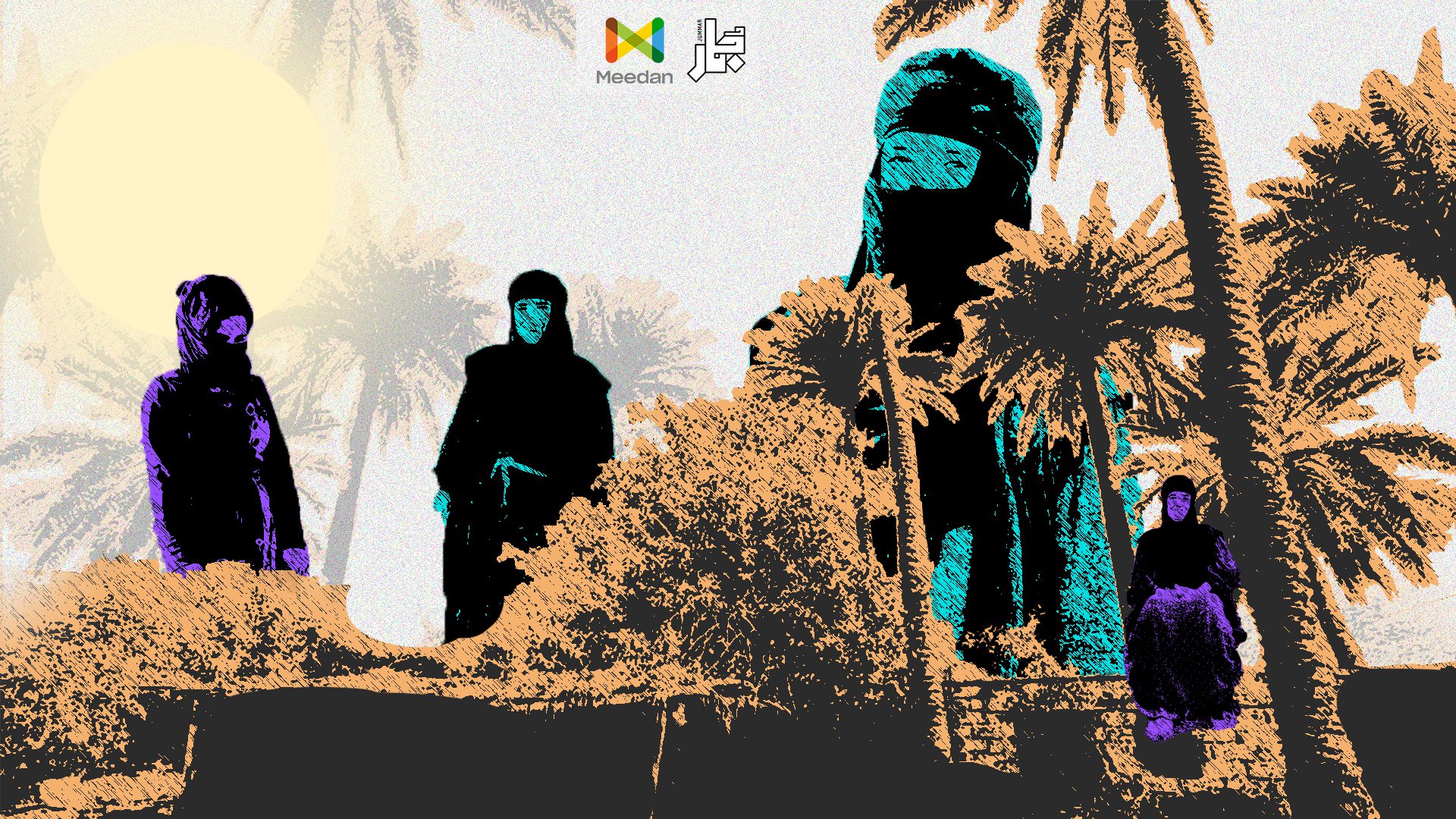Women Farmers between the Tigris and Euphrates: We Cultivate, but Drought Defeats Us
27 Jul 2023
Shifaa, Sondos and Zahida, three women farmers whose lives are changing due to the worsening drought that overwhelms them, and their arduous labour under the sun all day does not yield enough income for their survival. The story of women farmers between the Tigris and Euphrates, who work hard, but the drought ruins all their efforts
While she crouches among the crops of her family’s field, Shifaa’s utmost wish is that the sun be gentle on her, as she secures her family’s daily needs. Fourteen-year-old Shifaa was a school student until a teacher taunted her one day, forcing her to drop out of school and begin work. She is now responsible for harvesting okra from a field in Al-Mutasim district, in the southern Salah Al-Din governorate.
She did not consider that running away from school would bring her face to face with a reality that was totally different from her expectations. She thought that work would give her a better life, but she already suffers from skin conditions and itching on her hands due to daily contact with the okra.
Shifaa complains that climate change takes a toll on the yields of the field, as excessively high temperatures reduce the ability of agricultural workers to reap their crops, and drought diminishes cultivated areas. Although her village is in a district bordered by the River Tigris from the west and the River Rasasi from the east, drought is spreading there, as in all regions of Iraq.

“When the temperature rises, we are unable to go out to work, harvest, or sell”, Shifaa tells Jummar. Shifaa is not included in the International Labour Organisation’s statistics on the female labour force in Iraq, but she faces the same hardships and suffers as they do.
A tough reality
The International Labour Organisation in Iraq reports that of the thirteen million Iraqi women over the age of fifteen, only around one million are employed. This survey was released in 2021. “Many women work in the agricultural sector and food processing plants, especially in date and tomato processing factories”, says Maha Qattaa, the ILO’s country coordinator in Iraq.
The agricultural sector employs 8.4 per cent of the labour force in Iraq, of which twenty per cent are women, compared to five per cent of women in the industrial labour force and thirteen per cent in the labour force in the services sector.

Salah Al-Din governorate includes about one million dunums (where one dunum equals 1000 square metres) of arable land, and wheat is the most cultivated crop, followed by barley. Most agricultural lands are in Ad-Dujail, Balad, Samarra, Al-Dhuluiya, and Al-Alam.
Qattaa indicates that agricultural workers often face challenges in their efforts to help establish decent working conditions, as their wages are low, and their working environment is challenging and sometimes even dangerous.
Furthermore, 95.8 per cent of workers in agriculture occupy irregular jobs. The minimal social security paid for irregular workers exposes farmers and their families to a greater risk of poverty related to economic shocks and life-cycle risks.
“Seventy-two per cent of agricultural employees receive low wages, calculated as one-third of the average hourly earnings of employees in other key sectors”, Qattaa explains.
Unsupported spending
The General Secretariat of the Iraqi Council of Ministers contains the Higher Committee for Rural Women Empowerment, which is supposed to provide a consolidated view regarding rural women’s issues and to approve plans and programmes that serve their needs and requirements and other welfare tasks.
Yusra Al-Allaq, the head of this committee, says that she is coordinating with the relevant authorities to provide financial support to rural women and reactivate the Agricultural Credit Fund to include rural women in agricultural loans with little or no interest, as well as promoting and marketing in support of local agricultural products. Moreover, the support would consist of organising special exhibitions for women in rural areas and the marshes to market their products as well as preparing training programmes for them to raise their educational level, reduce illiteracy among them, and end the problem of school dropout rates through necessary measures. It would also provide health care and follow-up procedures for their medical needs and vaccines, raise awareness of infectious diseases, and combat gender-based violence.
However, several rural women told Jummar that they do not receive any support from the government.
Sondos (forty-two years old) is one of those workers. She was forced to work as a farmer in lieu of her husband after his disability made him no longer able to till and cultivate the land. Currently, she provides for her husband and six children, the eldest of whom is a twenty-two-year-old who suffers from rickets.
The family lives in a rented house, but its roof does not protect them from the winter rains. Still, the family is trying hard to face their life struggles. The children are eager to go to school, and after they return, they help their mother tilling and cultivating the land and harvesting crops. “The life of farmers is draining and unhealthy”, Sondos tells Jummar.
When summer came, Sondos’s suffering as a farmer worsened as the water receded to the point of not being available for up to seven days. The lack of water causes many plants to wilt, which wastes time, effort, and money. Due to climate change and the consequences of drought and high temperatures, Sondos gets a meagre income that is barely enough to buy food. “We cannot even buy clothes”, she adds.

She states that government support is confined to farmers included in the agricultural plan and those who own an agricultural contract or Tapu (title deed), which is also insufficient. Therefore, she must purchase fertilisers, pesticides, and the other agricultural materials at her own expense.
Barren pastures
Al-Allaq admits that rural women get poor financing and suffer from water scarcity and high temperatures.
Hajar Muhammad Hussein, Coordinator of the Information Centre for Research and Development, also mentions that rural women lack access to resources and opportunities that female agricultural workers and animal breeders need to be more productive. She points out that rural women face extreme climatic challenges such as water scarcity and climate change, while they depend on natural resources and agricultural production as life essentials.
Iman Ahmad Al-Kadhim, Head of Al-Buhturi Foundation for Development and Culture, agrees that agricultural supplies such as tools and fertilisers are not available, and if they are, they are at exorbitant prices, this in addition to climate change and water scarcity which compounds farmers’ problems.
She tells Jummar that winter rainwaters alone are insufficient to irrigate crops, leading to seventeen per cent of female agricultural workers moving from the countryside to the cities. The displacement of rural families to the city has resulted in high rates of child labour and mendicancy. At the same time, many female peasants have resorted to working in domestic service and shops or preparing homemade meals to sell to make a living. Moreover, some women have contracted diseases after moving from the countryside to the city due to environmental and air quality changes.
Zahida (fifty-five years old) is keen to stay in her village and continue raising livestock and poultry despite the odds. She wants to save herself and her family from entering a cycle of poverty and hardship. She spent forty-five years of her life raising animals in the countryside. She married and had five sons and three daughters, then her husband passed away, but she continued working. However, she also suffers from the consequences of climate change and drought.
Because of the diminishing of green areas due to water depletion, Zahida is forced to buy animal feed at a very high price, which prompted her to sell most of her cows and keep only seven of the twenty she previously owned. Still, even the remaining seven cows are at risk of diseases and death due to the excessively high temperatures.

Zahida buys a haycart load for 250,000 dinars (about 169 US dollars) to feed her cows, but she sells a bottle of milk for a price not exceeding 1,500 dinars. Her sales volume is at most five bottles per day. “This income is not even enough to buy my medications”, said Zahida, whose work has damaged her joints.
Illiteracy
The percentage of illiterate women is about fifty-five per cent of all rural women throughout Iraq due to their challenging living conditions. “The admissible age groups in the literacy programme start at the age of fifteen”, said Ahmad Nazeer Mustafa, Head of the Literacy Division in Samarra district, affiliated with the Literacy Department in Salah Al-Din Governorate.
Some rural women were discovered to have talents such as drawing and calligraphy through their studies in literacy centres. There is a lack of girls’ schools in the Iraqi countryside due to the tribal traditions that prevent girls from attending schools, as according to officials, it is not reasonable to open a full-fledged school to teach just two or three students.
Najm Al-Lahibi, a member of a former Parliamentary Committee on Agriculture, admits that the executive and legislative authorities have no plans to support rural women. He points out that many rural families have been displaced due to desertification and climate change towards the Kurdistan region. They are now working for plantation owners there for low wages that barely cover their cost of living.



Associations and organisations concerned with the affairs of rural men and women are unable to provide them with the necessary help, as they are in turn not supported by the government. “The government does not support us, and therefore we cannot help the farmer”, said Latif Khalaf, Head of the Peasants’ Association in Samarra.
Thus, peasants face their difficulties with their own modest capabilities. For instance, they dig wells reaching 170 metres in depth in areas of Salah Al-Din to obtain water, which is a costly process. They tend to grow strategic crops like wheat due to drought, “as it does not need much water”, says Marwan Diab Ghanem, Head of the Agricultural Extension Department at Salah Al-Din Agricultural Directorate.
With no hope of receiving support, Shifaa, Sondos, and Zahida have no other options but to face hardships with strength and patience, hoping that the climate will become gentler and relieve them from drought and heat.
*This article is supported by the Check Global Program – Meedan Foundation.
Read More


“His gaze was intrusive; it pierced my soul”: On the Struggles of Divorced Women in Navigating Courts and Governmental Institutions
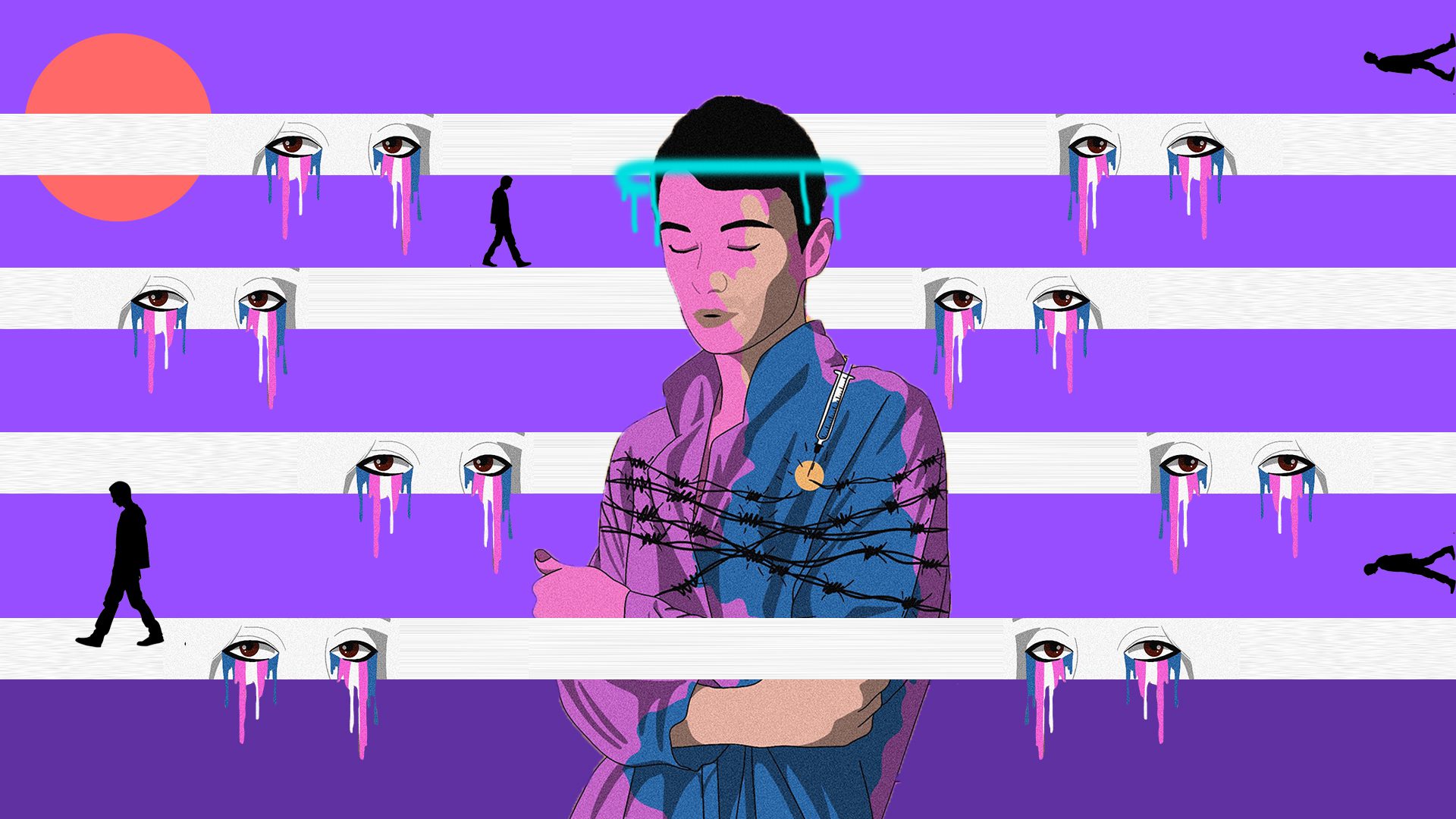

“She Brought a Fatwa from Khamenei and Al-Azhar, But It Went Nowhere”: The Struggles of Trans People in the Iraqi Health Sector
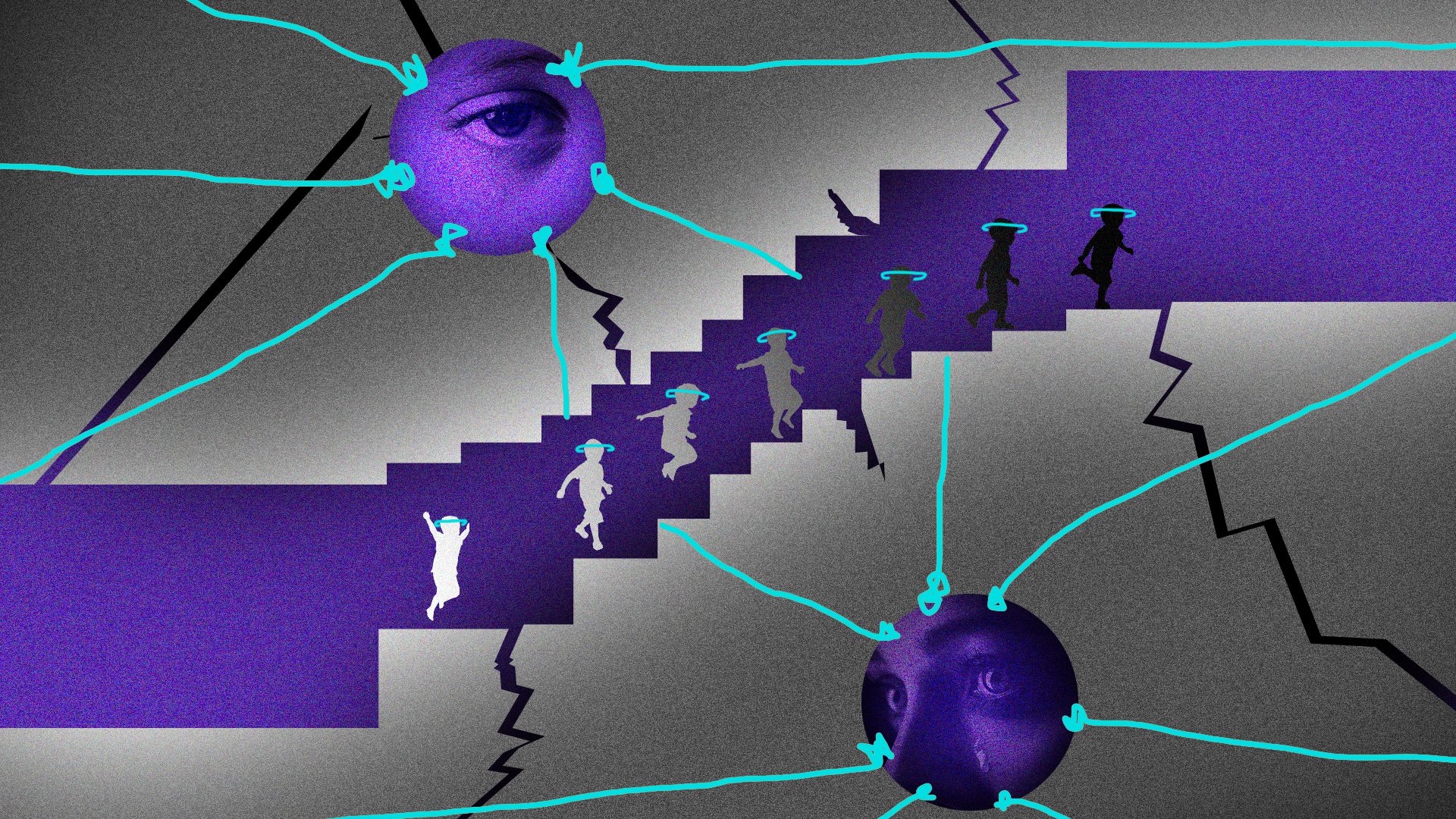

“Everyone has a Right to the Kids Except their Mother”: On Women Fighting for the Custody of Their Children
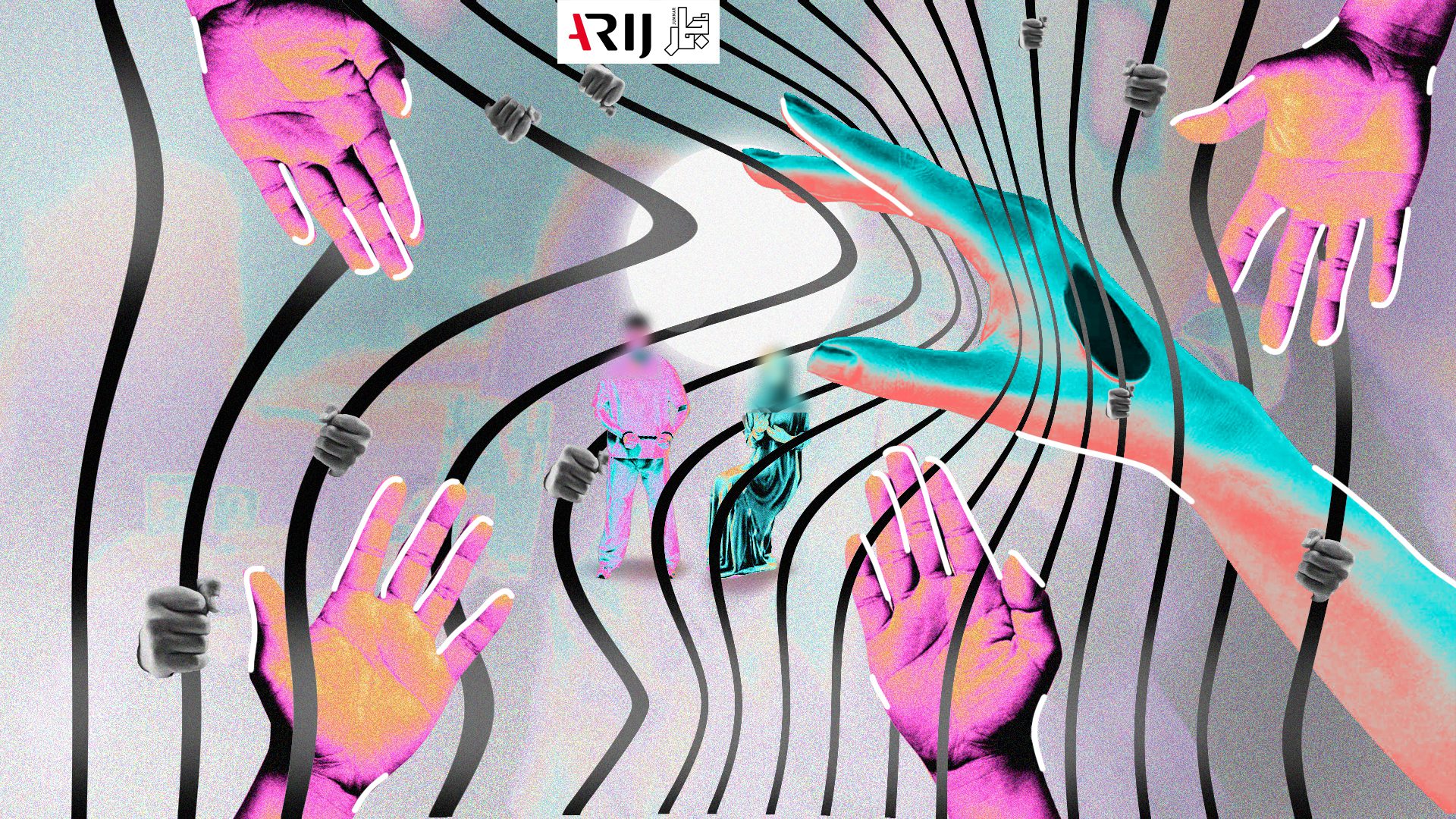

Iraqi Prisoners Blackmailed to Pay To Obtain Release Papers After Completing Their Sentence
While she crouches among the crops of her family’s field, Shifaa’s utmost wish is that the sun be gentle on her, as she secures her family’s daily needs. Fourteen-year-old Shifaa was a school student until a teacher taunted her one day, forcing her to drop out of school and begin work. She is now responsible for harvesting okra from a field in Al-Mutasim district, in the southern Salah Al-Din governorate.
She did not consider that running away from school would bring her face to face with a reality that was totally different from her expectations. She thought that work would give her a better life, but she already suffers from skin conditions and itching on her hands due to daily contact with the okra.
Shifaa complains that climate change takes a toll on the yields of the field, as excessively high temperatures reduce the ability of agricultural workers to reap their crops, and drought diminishes cultivated areas. Although her village is in a district bordered by the River Tigris from the west and the River Rasasi from the east, drought is spreading there, as in all regions of Iraq.

“When the temperature rises, we are unable to go out to work, harvest, or sell”, Shifaa tells Jummar. Shifaa is not included in the International Labour Organisation’s statistics on the female labour force in Iraq, but she faces the same hardships and suffers as they do.
A tough reality
The International Labour Organisation in Iraq reports that of the thirteen million Iraqi women over the age of fifteen, only around one million are employed. This survey was released in 2021. “Many women work in the agricultural sector and food processing plants, especially in date and tomato processing factories”, says Maha Qattaa, the ILO’s country coordinator in Iraq.
The agricultural sector employs 8.4 per cent of the labour force in Iraq, of which twenty per cent are women, compared to five per cent of women in the industrial labour force and thirteen per cent in the labour force in the services sector.


Salah Al-Din governorate includes about one million dunums (where one dunum equals 1000 square metres) of arable land, and wheat is the most cultivated crop, followed by barley. Most agricultural lands are in Ad-Dujail, Balad, Samarra, Al-Dhuluiya, and Al-Alam.
Qattaa indicates that agricultural workers often face challenges in their efforts to help establish decent working conditions, as their wages are low, and their working environment is challenging and sometimes even dangerous.
Furthermore, 95.8 per cent of workers in agriculture occupy irregular jobs. The minimal social security paid for irregular workers exposes farmers and their families to a greater risk of poverty related to economic shocks and life-cycle risks.
“Seventy-two per cent of agricultural employees receive low wages, calculated as one-third of the average hourly earnings of employees in other key sectors”, Qattaa explains.
Unsupported spending
The General Secretariat of the Iraqi Council of Ministers contains the Higher Committee for Rural Women Empowerment, which is supposed to provide a consolidated view regarding rural women’s issues and to approve plans and programmes that serve their needs and requirements and other welfare tasks.
Yusra Al-Allaq, the head of this committee, says that she is coordinating with the relevant authorities to provide financial support to rural women and reactivate the Agricultural Credit Fund to include rural women in agricultural loans with little or no interest, as well as promoting and marketing in support of local agricultural products. Moreover, the support would consist of organising special exhibitions for women in rural areas and the marshes to market their products as well as preparing training programmes for them to raise their educational level, reduce illiteracy among them, and end the problem of school dropout rates through necessary measures. It would also provide health care and follow-up procedures for their medical needs and vaccines, raise awareness of infectious diseases, and combat gender-based violence.
However, several rural women told Jummar that they do not receive any support from the government.
Sondos (forty-two years old) is one of those workers. She was forced to work as a farmer in lieu of her husband after his disability made him no longer able to till and cultivate the land. Currently, she provides for her husband and six children, the eldest of whom is a twenty-two-year-old who suffers from rickets.
The family lives in a rented house, but its roof does not protect them from the winter rains. Still, the family is trying hard to face their life struggles. The children are eager to go to school, and after they return, they help their mother tilling and cultivating the land and harvesting crops. “The life of farmers is draining and unhealthy”, Sondos tells Jummar.
When summer came, Sondos’s suffering as a farmer worsened as the water receded to the point of not being available for up to seven days. The lack of water causes many plants to wilt, which wastes time, effort, and money. Due to climate change and the consequences of drought and high temperatures, Sondos gets a meagre income that is barely enough to buy food. “We cannot even buy clothes”, she adds.


She states that government support is confined to farmers included in the agricultural plan and those who own an agricultural contract or Tapu (title deed), which is also insufficient. Therefore, she must purchase fertilisers, pesticides, and the other agricultural materials at her own expense.
Barren pastures
Al-Allaq admits that rural women get poor financing and suffer from water scarcity and high temperatures.
Hajar Muhammad Hussein, Coordinator of the Information Centre for Research and Development, also mentions that rural women lack access to resources and opportunities that female agricultural workers and animal breeders need to be more productive. She points out that rural women face extreme climatic challenges such as water scarcity and climate change, while they depend on natural resources and agricultural production as life essentials.
Iman Ahmad Al-Kadhim, Head of Al-Buhturi Foundation for Development and Culture, agrees that agricultural supplies such as tools and fertilisers are not available, and if they are, they are at exorbitant prices, this in addition to climate change and water scarcity which compounds farmers’ problems.
She tells Jummar that winter rainwaters alone are insufficient to irrigate crops, leading to seventeen per cent of female agricultural workers moving from the countryside to the cities. The displacement of rural families to the city has resulted in high rates of child labour and mendicancy. At the same time, many female peasants have resorted to working in domestic service and shops or preparing homemade meals to sell to make a living. Moreover, some women have contracted diseases after moving from the countryside to the city due to environmental and air quality changes.
Zahida (fifty-five years old) is keen to stay in her village and continue raising livestock and poultry despite the odds. She wants to save herself and her family from entering a cycle of poverty and hardship. She spent forty-five years of her life raising animals in the countryside. She married and had five sons and three daughters, then her husband passed away, but she continued working. However, she also suffers from the consequences of climate change and drought.
Because of the diminishing of green areas due to water depletion, Zahida is forced to buy animal feed at a very high price, which prompted her to sell most of her cows and keep only seven of the twenty she previously owned. Still, even the remaining seven cows are at risk of diseases and death due to the excessively high temperatures.



Zahida buys a haycart load for 250,000 dinars (about 169 US dollars) to feed her cows, but she sells a bottle of milk for a price not exceeding 1,500 dinars. Her sales volume is at most five bottles per day. “This income is not even enough to buy my medications”, said Zahida, whose work has damaged her joints.
Illiteracy
The percentage of illiterate women is about fifty-five per cent of all rural women throughout Iraq due to their challenging living conditions. “The admissible age groups in the literacy programme start at the age of fifteen”, said Ahmad Nazeer Mustafa, Head of the Literacy Division in Samarra district, affiliated with the Literacy Department in Salah Al-Din Governorate.
Some rural women were discovered to have talents such as drawing and calligraphy through their studies in literacy centres. There is a lack of girls’ schools in the Iraqi countryside due to the tribal traditions that prevent girls from attending schools, as according to officials, it is not reasonable to open a full-fledged school to teach just two or three students.
Najm Al-Lahibi, a member of a former Parliamentary Committee on Agriculture, admits that the executive and legislative authorities have no plans to support rural women. He points out that many rural families have been displaced due to desertification and climate change towards the Kurdistan region. They are now working for plantation owners there for low wages that barely cover their cost of living.



Associations and organisations concerned with the affairs of rural men and women are unable to provide them with the necessary help, as they are in turn not supported by the government. “The government does not support us, and therefore we cannot help the farmer”, said Latif Khalaf, Head of the Peasants’ Association in Samarra.
Thus, peasants face their difficulties with their own modest capabilities. For instance, they dig wells reaching 170 metres in depth in areas of Salah Al-Din to obtain water, which is a costly process. They tend to grow strategic crops like wheat due to drought, “as it does not need much water”, says Marwan Diab Ghanem, Head of the Agricultural Extension Department at Salah Al-Din Agricultural Directorate.
With no hope of receiving support, Shifaa, Sondos, and Zahida have no other options but to face hardships with strength and patience, hoping that the climate will become gentler and relieve them from drought and heat.
*This article is supported by the Check Global Program – Meedan Foundation.
